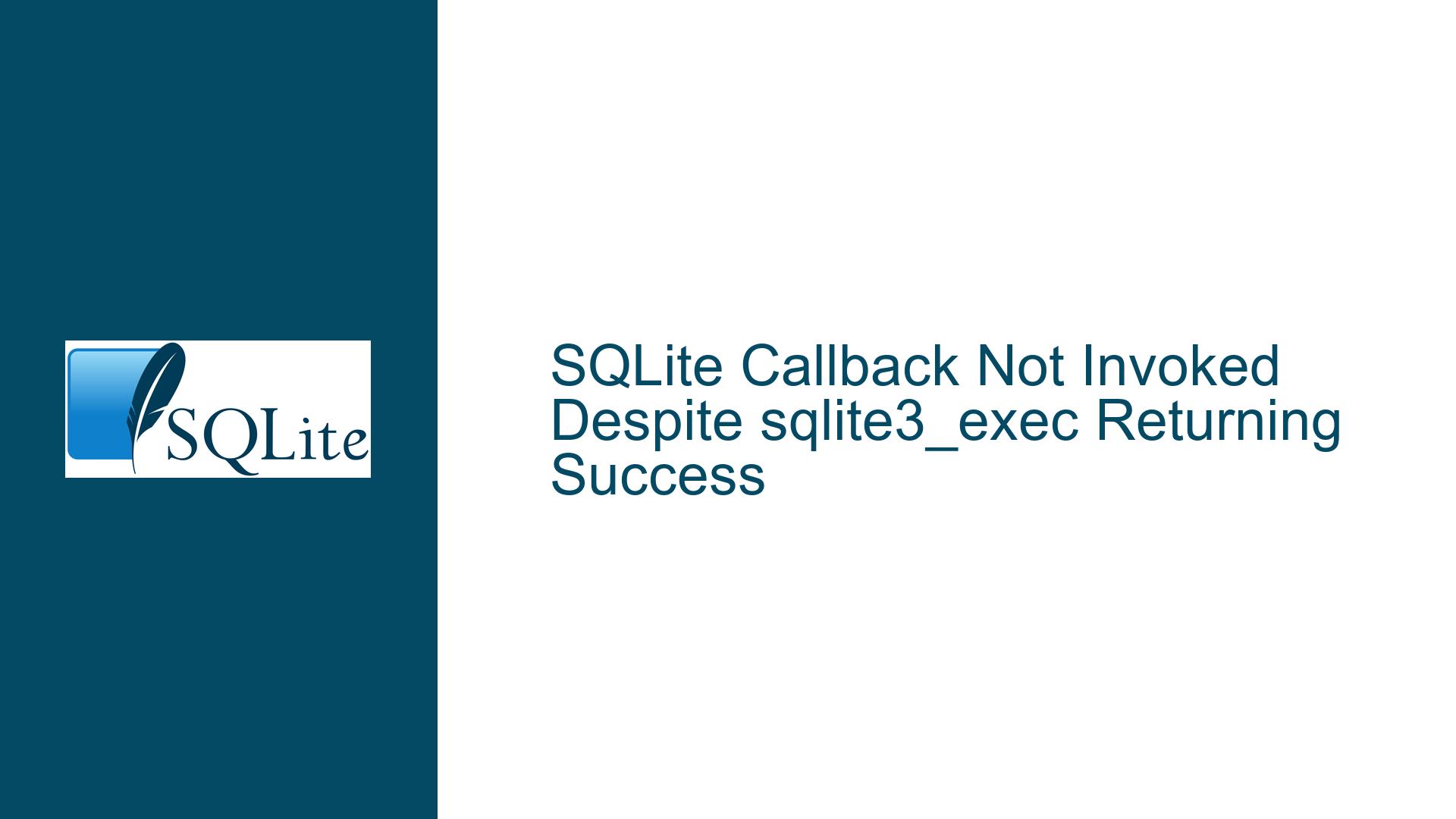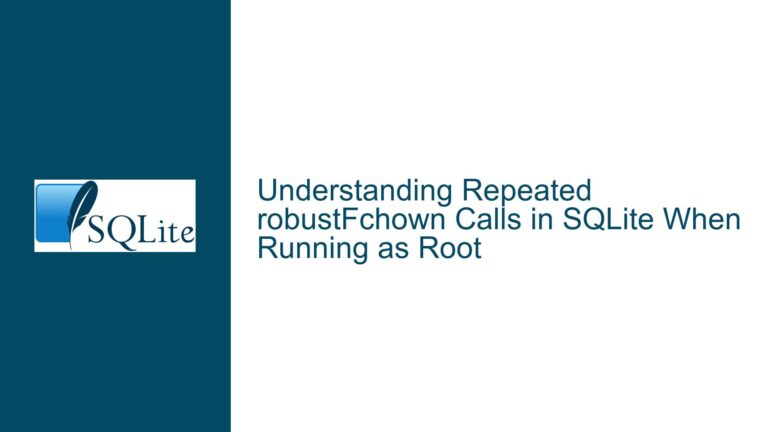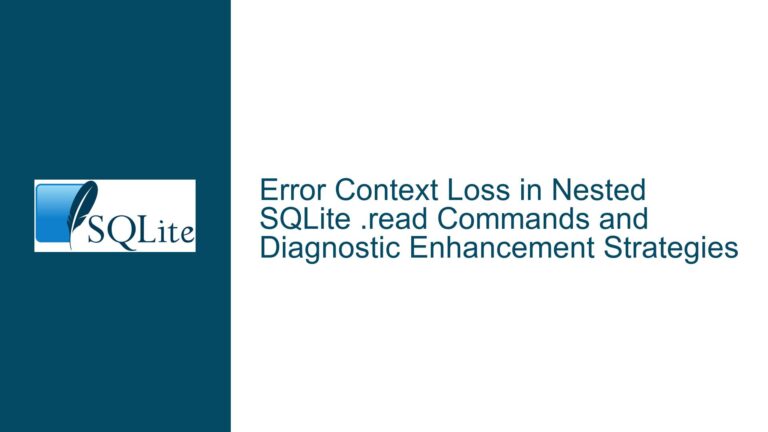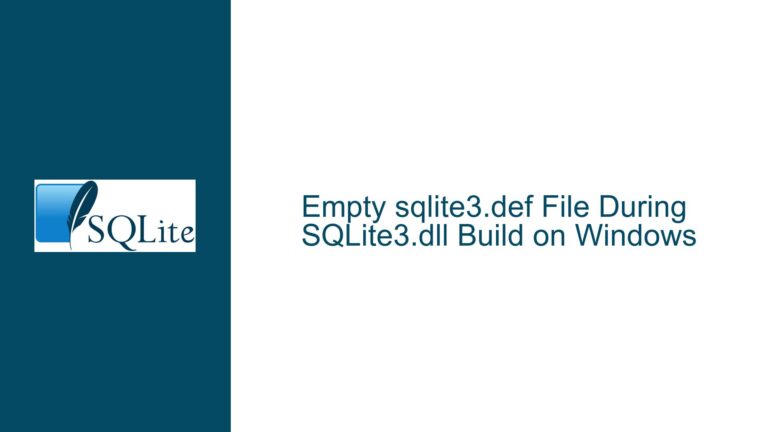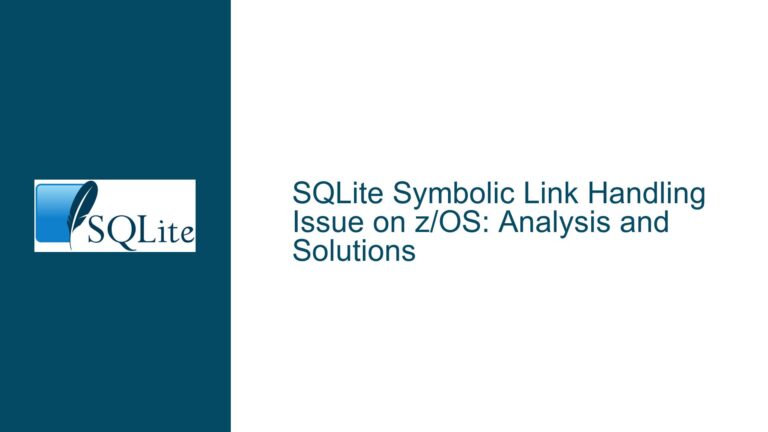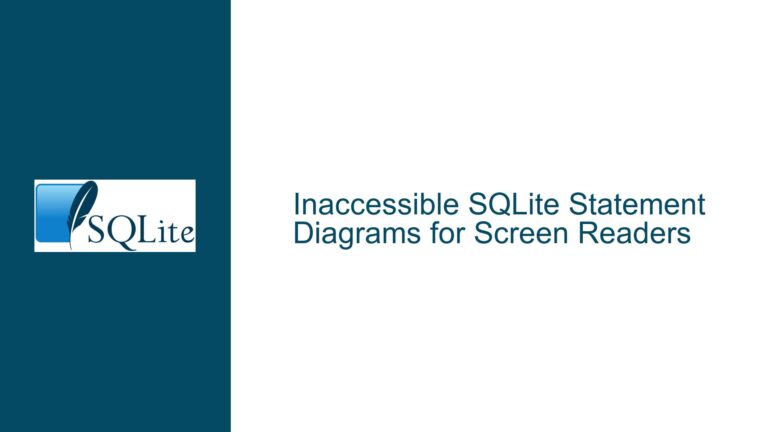SQLite Callback Not Invoked Despite sqlite3_exec Returning Success
Understanding Callback Non-Invocation with sqlite3_exec in C++ Applications
Issue Overview: Callback Function Not Triggered During SQL Execution
When working with SQLite’s sqlite3_exec API in C++, a common frustration arises when the callback function fails to execute despite the API returning a success code (SQLITE_OK, or 0). This issue typically manifests in scenarios where:
- Callback Function Placement: The callback is declared outside a class but referenced within a class-based context, leading to visibility or linkage issues.
- SQL Statement Validity: The SQL statement passed to
sqlite3_execis syntactically valid but functionally inert (e.g., empty or containing no actionable commands). - Compiler/Linker Behavior: Misalignment between the callback’s signature and the function pointer expected by
sqlite3_exec, especially in object-oriented code.
The core problem lies in the interplay between SQLite’s execution model and the developer’s assumptions about how callbacks are registered and invoked. When sqlite3_exec returns 0, it indicates that the SQL parsing and execution framework encountered no errors—not that the callback was invoked. If the SQL statement does not produce a result set (e.g., SELECT with no rows, or non-query statements like INSERT), the callback will not fire.
Additionally, in C++ class-based designs, non-static member functions cannot be directly used as callbacks due to implicit this pointer requirements. This leads to compilation failures unless the callback is declared static or defined outside the class.
Critical Factors Leading to Silent Callback Failure
1. Incorrect Callback Function Signature or Linkage
SQLite’s sqlite3_exec requires a function pointer matching the signature:
int (*callback)(void*, int, char**, char**);
If the callback is a non-static C++ member function, the compiler implicitly adds a this parameter, altering the function’s signature. This mismatch prevents the callback from being invoked, as SQLite cannot resolve the function address correctly.
2. Empty or Non-Result-Producing SQL Statements
sqlite3_exec executes all semicolon-separated SQL statements in the provided string. If the SQL is empty, contains only comments, or comprises statements like CREATE TABLE (which produce no rows), the callback will not trigger. Developers often misinterpret the SQLITE_OK return code as confirmation of callback execution, but it merely indicates the absence of syntax or runtime errors.
3. Buffer Handling and SQL String Corruption
Improperly initializing or formatting the SQL string buffer (e.g., using sprintf without bounds checking) can lead to buffer overflows, unterminated strings, or unintended truncation. For example:
char sql[256];
sprintf(sql, "%s", sqlstr); // Risk of overflow if sqlstr exceeds 255 characters
If sql is corrupted or empty, sqlite3_exec silently processes nothing, returning 0 without invoking the callback.
4. Debugging Toolchain Limitations
In environments like C++/CLI Windows Forms applications, standard output (e.g., cout) may be unavailable or redirected. Debugging via breakpoints in the callback can fail if the compiler optimizes out the callback body (e.g., due to empty loops or unused variables).
Resolving Callback Issues: Step-by-Step Solutions
Step 1: Validate the SQL Statement’s Content and Integrity
Before invoking sqlite3_exec, ensure the SQL string is non-empty and produces a result set. Test the SQL in a standalone tool (e.g., sqlite3 shell). In code:
// Use std::string for safer buffer handling
std::string sql = "SELECT * FROM my_table;";
if (sql.empty()) {
Debug::WriteLine("SQL string is empty!");
return;
}
// Pass the C-style string to sqlite3_exec
rc = sqlite3_exec(db, sql.c_str(), callback, nullptr, &zErrMsg);
Key Checks:
- Verify the SQL string’s length before execution.
- Use
std::stringorstd::vector<char>to avoid buffer overflows. - Log the SQL string to confirm its correctness.
Step 2: Ensure Callback Function Compatibility
If the callback is part of a C++ class, declare it as static to eliminate the implicit this pointer:
class MyClass {
public:
static int staticCallback(void* data, int argc, char** argv, char** colNames) {
// Access class instance via data parameter if needed
MyClass* instance = static_cast<MyClass*>(data);
return 0;
}
};
When invoking sqlite3_exec, pass the static callback and an instance pointer as user data:
MyClass instance;
rc = sqlite3_exec(db, sql.c_str(), MyClass::staticCallback, &instance, &zErrMsg);
Alternatives:
- Define the callback outside the class.
- Use a lambda with capture (C++11 or newer) if SQLite’s C API permits (requires bridging to a C-compatible function).
Step 3: Debugging and Observability Enhancements
In environments without console output, use platform-specific debugging mechanisms:
static int callback(void* data, int argc, char** argv, char** colNames) {
#ifdef _WIN32
OutputDebugStringA("Callback invoked!\n");
#endif
return 0;
}
Breakpoints:
- Place breakpoints after any prologue instructions in the callback.
- Disable compiler optimizations (
/Odin Visual Studio) to prevent code elimination.
Step 4: Inspect sqlite3_exec’s Return Code and Error Messages
Even when sqlite3_exec returns 0, check the error message for warnings:
char* zErrMsg = nullptr;
rc = sqlite3_exec(db, sql.c_str(), callback, nullptr, &zErrMsg);
if (rc != SQLITE_OK) {
Debug::WriteLine("SQL error: " + gcnew String(zErrMsg));
sqlite3_free(zErrMsg);
} else {
Debug::WriteLine("SQL executed successfully (no result set?)");
}
Note: If zErrMsg remains nullptr after SQLITE_OK, the SQL executed correctly but produced no rows.
Step 5: Test with Minimal Reproducible Examples
Isolate the issue by creating a minimal example that excludes class dependencies:
#include <sqlite3.h>
#include <iostream>
static int callback(void*, int, char** argv, char**) {
std::cout << "Value: " << (argv[0] ? argv[0] : "NULL") << "\n";
return 0;
}
int main() {
sqlite3* db;
sqlite3_open(":memory:", &db);
sqlite3_exec(db, "SELECT 42;", callback, nullptr, nullptr);
sqlite3_close(db);
return 0;
}
If this works, incrementally reintroduce class and form components to identify the breaking change.
Step 6: Address Compiler Warnings and Mismatches
Enable all compiler warnings (/W4 in Visual Studio) to catch issues like:
- Unused variables in the callback.
- Implicit pointer casts.
- Incorrect function signatures.
Step 7: Threading and Asynchrony Considerations
Ensure that sqlite3_exec is not called from a thread where SQLite connections are not allowed. SQLite3 connections are not thread-safe by default unless serialized.
By methodically addressing SQL validity, callback signature compliance, and debugging visibility, developers can resolve the majority of callback invocation issues in SQLite3. The key takeaway is to treat sqlite3_exec’s return code as a statement about SQL execution—not callback activity—and to rigorously validate both the SQL and the callback’s technical setup.
